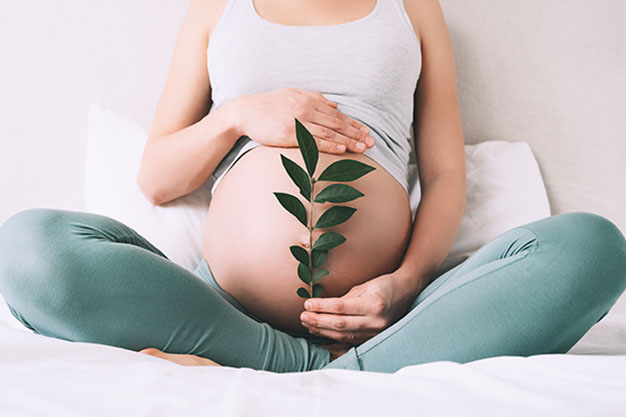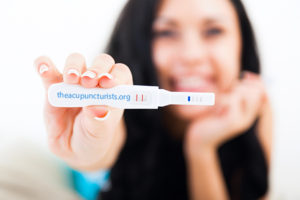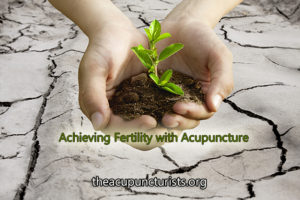The Acupuncture Infertility Specialists of South Florida

By Dr. Robert Herbst – Margate, Florida – Have you been struggling to conceive for more than six months without success? You are not the only one experiencing fertility problems. According to the National Survey of Family Growth cited by Chandra et al (2013), up to 15% of all American couples experience issues conceiving. Before we move on please rest assured that there is help and there is hope. Acupuncture for infertility can work wonders, and along with herbal medicine can regulate and rebalance hormones and systems in your body to help you get pregnant. Read on…
Infertility is caused by an issue or a combination of issues that hamper a woman’s ability to get pregnant or impede on a man’s ability to sire. Luckily, the majority of infertility cases are treatable and there’re a number of safe therapies with proven effectiveness that can remarkably improve your capability of having a baby.
One such therapy is acupuncture. A recently concluded research at Tel Aviv University and published in the European Journal of Integrative Medicine showed that 66% of persons who had acupuncture conceived compared to less than 40% of participants who did not receive acupuncture treatment. For the millions of couples who have problems conceiving or are diagnosed with infertility, acupuncture may be all they need to have children of their own. But what exactly do we mean by the term infertility?
Infertility definitions
The majority of couples (about 85 percent) conceive inside 12 months of trying. The World Health Organization thus defines infertility as a disease that leads to the inability to conceive after at least one year of having regular unprotected sex. The current Semen Manual by the WHO adds that infertility is the failure of a couple, that is sexually active and not using contraceptives, to attain pregnancy in a period of 12 months.
Other definitions of infertility incorporate a demographic view that infertility is the incapacity of persons of within a productive age (15 to 49 years) to achieve pregnancy after at least a year’s exposure to pregnancy. Infertility is categorized into two groups namely primary infertility and secondary infertility.
- Primary infertility: Primary infertility refers to a scenario in which a woman has never had a pregnancy or hasn’t had a live birth.
- Secondary infertility: If a woman cannot have a baby because she is not able to get pregnant or she cannot have a live birth after carrying a pregnancy, yet she had previously been pregnant or she had a live birth before, she is said to have secondary infertility.
- Sterility: Sterility points to a condition in which there’s no chance of ever becoming pregnant. Sterility is not the same as infertility which denotes a reduced capability to achieve pregnancy.
The biggest number of couples who are yet to have a child and have a problem conceiving, with the female partner below 50 years of age, are said to be infertile rather than sterile.
Causes of infertility
Men’s infertility usually results from diminished or absence of sperm count, damaged sperms, some diseases and varicocele. Factors that increase the risk of men’s fertility include smoking, age, alcohol, drug and other substance abuse, health conditions, some medications, and treatments such as chemotherapy and exposure to radiation.
Factors which heighten women’s susceptibility to infertility include all the risk factors for men as well as issues related to ovulation, PCOS, endometriosis, pelvic inflammatory disease, fallopian tube blockage, poor dieting and stresses. Naturally, women’s fertility decreases remarkably with age.
Many women who have hit the age of 35 experience problems conceiving, the number of their eggs and their health reduce remarkably. The ovary of an older woman is also not likely to release the egg, she is a greater risk to miscarry and experience other health issues.
Related – Read about Acupuncture and Premature Ovarian Failure
It is recommended that women past 35 years see a doctor if they’ve tried to conceive for six months without success. Women below this age should try for at least 12 months before they contact a doctor. However, some cases necessitate that you consult a doctor as soon as you experience fertility problems.
Women who have infrequent menstrual periods, those who have had sexually transmitted infections or pelvic conditions, those with a history of endometrial polyp or uterine fibroids, as well as men whose semen have abnormalities should seek treatment inside 6 months of trying.
Typical infertility treatments
There exists oral pills such as clomiphene citrate and injections like gonadotropins for stimulating the ovary to produce eggs. Another common infertility treatment is insemination or IUI whereby preparation for the sperm is done before it is placed in the uterine cavity. This way, the cervix is bypassed and the sperm is brought closer to the ovulated egg, thereby increasing the chances that fertilization would take place.
In-vitro fertilization is another treatment that involves the collection and fertilization of the egg outside the body. Surgical operations such as hysteroscopy and laparoscopy may also be recommended to correct a reproductive health abnormality.
Alternative treatment like acupuncture is increasingly gaining popularity due to its great effectiveness in treating infertility. It helps patients shun the knife and remarkably improves ability to achieve pregnancy when used together with other treatments.
Fertility drugs also increase pregnancy rates, but they come with unsightly side effects like massive weight gain, abdominal tenderness and some are strongly linked to breast cancer. This increases the need to try the safe and effective alternative acupuncture treatment.
Related – learn about Chinese Herbs for Infertility
Acupuncture for Infertility

Specialists in reproductive health are increasingly turning to the time-tested Chinese medicine, particularly acupuncture and Chinese herbs to help treat infertility and give hope to patients who have had long standing fertility problems that they can have children of their own.
The age-old Chinese herbal medication along with acupuncture treatment helps stimulate the production of eggs and thus improve the odds of becoming pregnant without using the common fertility medications.
Undergoing acupuncture for infertility prior to using other common treatments has been known to help many patients sidestep the regular infertility medications altogether.
While numerous persons who have had acupuncture alone go forth and make babies, success has also been reported when acupuncture is combined with modern treatments for reproductive issues. For instance, a 2002 study published in the Fertility and Sterility journal showed that when acupuncture is incorporated together with IVF (in vitro fertilization), it remarkably enhances the chances of becoming pregnant. That is why acupuncture has become so popular as treatment to support IVF.
Related – Learn how we incorporate Nutrition and Diet into our treatment plans to enhance fertility
How acupuncture treats infertility
From a Traditional Chinese Medicine standpoint, acupuncture kindles and improves the movement of Qi – life energy that must move freely throughout the body. When Qi is obstructed or unbalanced the body becomes sick or results to disorders such as infertility. As such, acupuncture essentially works to restore balance and the free flow of Qi.
In the case of infertility, acupuncture causes a calming effect, restores a person’s wellbeing and remarkably improves the ability to sire children. Modern science has indeed established that acupuncture treatment helps regulate the menstrual cycle while balancing and improving the production of hormones linked to reproduction..
A 2002 report published in the Annals of Internal Medicine showed that acupuncture is incredibly helpful to women experiencing fertility problems because it increases the amount of blood reaching the ovaries, which consequently raises hormonal stimulation in the ovaries. Persons with chronic miscarriage can also benefit from acupuncture because it strengthens the uterus lining so it can withstand a fetus.
Related – Learn About Acupuncture to Prevent Miscarriage
There is HOPE!
 We have been successfully treating infertility cases for 15 + years and we are confident we can help you. Whether you are trying to become pregnant naturally or using an assisted reproductive technology such as IVF, IUI or FET, The Acupuncturists can help. Call 954-586-2273 to schedule an appointment with Dr. Robert Herbst today. Many insurances now cover acupuncture, and we are in network with many!
We have been successfully treating infertility cases for 15 + years and we are confident we can help you. Whether you are trying to become pregnant naturally or using an assisted reproductive technology such as IVF, IUI or FET, The Acupuncturists can help. Call 954-586-2273 to schedule an appointment with Dr. Robert Herbst today. Many insurances now cover acupuncture, and we are in network with many!
We are located in Broward County, and we have been serving Margate, Coral Springs, Coconut Creek, Tamarac, Boca Raton, Parkland, Deerfield Beach, Pompano Beach, and Ft Lauderdale, helping families achieve their dreams of having a family for 15+ years. See our reviews on Google.
References
- http://www.who.int/reproductivehealth/topics/infertility/DHS-CR9.pdf
- http://www.who.int/reproductivehealth/topics/infertility/definitions/en/
- Chandra, A., Copen, C. E., & Stephen, E. H. (2013). Infertility and impaired fecundity in the United States, 1982–2010: data from the National Survey of Family Growth. Natl Health Stat Report, 67(67), 1-19.
- Lu, J. C., Huang, Y. F., & Lü, N. Q. (2010). WHO Laboratory Manual for the Examination and Processing of Human Semen: its applicability to andrology laboratories in China. Zhonghua nan ke xue= National journal of andrology, 16(10), 867-871.
- Paulus, W. E., Zhang, M., Strehler, E., El-Danasouri, I., & Sterzik, K. (2002). Influence of acupuncture on the pregnancy rate in patients who undergo assisted reproduction therapy. Fertility and sterility, 77(4), 721-724.
- Sela, K., Lehavi, O., Buchan, A., Kedar-Shalem, K., Yavetz, H., & Lev-ari, S. (2011). Acupuncture and Chinese herbal treatment for women undergoing intrauterine insemination. European Journal of Integrative Medicine, 3(2), e77-e81.
- White, A., & Editorial Board of Acupuncture in Medicine. (2009). Western medical acupuncture: a definition. Acupuncture in Medicine, 27(1), 33.
- Zegers-Hochschild, F., Adamson, G. D., de Mouzon, J., Ishihara, O., Mansour, R., Nygren, K., … & Van der Poel, S. (2009). The international committee for monitoring assisted reproductive technology (ICMART) and the world health organization (WHO) revised glossary on ART terminology, 2009. Human Reproduction, dep343.
- Kaptchuk, T. J. (2002). Acupuncture: theory, efficacy, and practice. Annals of internal medicine, 136(5), 374-383.

